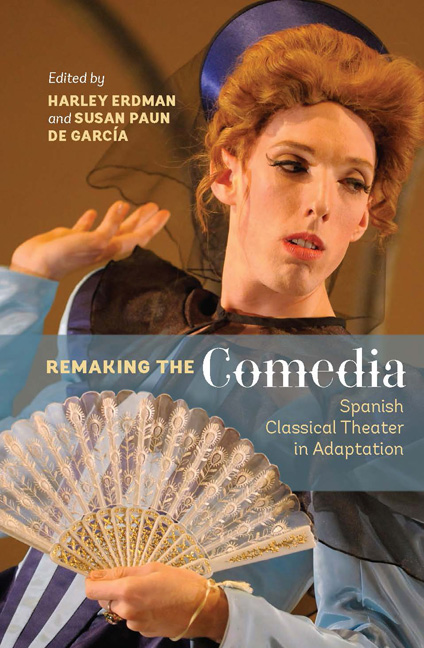Book contents
- Frontmatter
- Contents
- Illustrations
- Contributors
- Preface
- Note to the Reader
- Acknowledgements
- PART I THEORIZING
- 1 Terms and Concepts: The Adaptation of Classical Texts for the Stage
- 2 “Los senderos que se bifurcan:” Adaptation, Appropriation, and the Proliferation of Possibilities
- 3 Interpretative Directing Games for the Golden Age Repertory
- 4 Re-Make, Re-Mix, Re-Model
- PART II SURVEYING
- PART III SPOTLIGHTING
- PART IV SHIFTING
- Play Titles Cited
- Works Cited
- Index
3 - Interpretative Directing Games for the Golden Age Repertory
from PART I - THEORIZING
Published online by Cambridge University Press: 05 December 2015
- Frontmatter
- Contents
- Illustrations
- Contributors
- Preface
- Note to the Reader
- Acknowledgements
- PART I THEORIZING
- 1 Terms and Concepts: The Adaptation of Classical Texts for the Stage
- 2 “Los senderos que se bifurcan:” Adaptation, Appropriation, and the Proliferation of Possibilities
- 3 Interpretative Directing Games for the Golden Age Repertory
- 4 Re-Make, Re-Mix, Re-Model
- PART II SURVEYING
- PART III SPOTLIGHTING
- PART IV SHIFTING
- Play Titles Cited
- Works Cited
- Index
Summary
In Spain the theatrical canon has been perceived conservatively, constructed largely as illustrative, with few games and little playfulness in the distribution and understanding of characters. Directors and producers illustrate the period with a plethora of ruffs, pumpkin pants, and pastel colors. In contrast, in Latin America there is a latent lack of interest in Golden Age plays. A season in Colombia has more productions of Shakespeare, Tennessee Williams, and Molière than of any Spanish classical playwright, and the same happens in Mexico, Chile, and Argentina. We want to be Latin American, and we prefer Anglo-Saxon, Russian, or French theater to the stiff Spanish classics. However, this tendency prevents us from seeing the deep roots of our theatricality. Our sense of characterization, plot construction, language, even our perception of theater and the spectator—all are connected to the centuries-old Spanish theater. Preparing actors in the Golden Age repertory allows them to attain a sense of truth and comfort that can be transferred to other theatrical traditions.
We as Latin Americans are perfectly positioned to enjoy the Comedia with the freedom that comes from working with a dramatic corpus written in our own language but of which we have no historical, moral, or social performance tradition, allowing us to avoid exercises in local color or paleo-ethnography. We can approach Spanish Golden Age theater as García Lorca did in his theatrical project. He tried to bring a new meaning to Spanish classical theater, which had become smothered in Romantic affectation. Lorca's mission was to rediscover Lope, Calderón, and Cervantes through direction and adaptation, as an aesthetic basis for his own playwriting, and as a determining force in the construction of a new relationship with common people in the audience. Lorca, to enormous acclaim in Spain and Argentina, brought Lope to the stage with a conscious anachronism: “para acercarlo a nuestra sensibilidad actual” [“to bring him to our modern sensibility”] (Aguilera Sastre and Lizarraga Vizcarra 64).
- Type
- Chapter
- Information
- Remaking the ComediaSpanish Classical Theater in Adaptation, pp. 25 - 32Publisher: Boydell & BrewerPrint publication year: 2015



